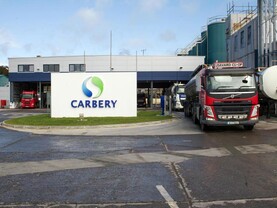With the central manufacturing facility, the Carbery entity is in an extremely strong financial position – a turnover of almost €420m, profits (EBITDA) of over €42m, almost no debt and a demonstrated capacity to consistently pay the highest milk price in the country.
Jason Hawkins expects the milk supply coming into Carbery to continue to grow by 3-4% per year.
He gave a categorical assurance that they will continue to process all the milk that is offered to them and that if, as seems likely, extra processing capacity is needed in three to four years’ time, the cost of that extra capacity will be met from the group’s own resources and there will be no levy or other charges imposed on farmers.
Carbery has a range of products but cheese is by far the most important.
The 50,000t plant in Ballineen is the largest in the country and about 30,000t of this is sold on the UK market, mostly going through the huge Ornua packaging facility at Leek in Staffordshire.
Obviously, the possibility of the UK crashing out of the EU at the end of March is a concern. A gradual exit would leave time for a measured diversification but as for any possible effect on farmers, he pointed to Carbery’s €10m stability fund which was established last year as providing some “rainy day” cover for milk price.
On milk price, he saw reasonable stability over the next few years but he did not commit himself to any specific price except to make the point that international demand was continuing to increase and he saw Ireland as a competitive, long-term producer when compared with the grain-intensive large units in the United States where he worked for almost 20 years – first with Kerry and latterly with Dairy Farmers of America, the largest dairy co-op in the world.
As chief executive of Carbery, he sits on the board of Ornua but apart from acknowledging the discussions around governance within Ornua and the arrival of the Truly Grass Fed label on Glanbia’s dairy products in the US market, he was not going to be drawn into a detailed analysis on either issue.
He saw Ornua and the corporate structure within Carbery as working well with the chair and chief executives of the four constituent co-ops on the board and providing a combination of business experience and direct farmer involvement – “if it’s not broken, why fix it?”
Most suppliers and industry observers would agree with this but as an important part of the overall Irish dairy and food industry, with a significant flavours and ingredients business on an international scale, it will be interesting to watch Carbery progress as Hawkins steers the group for which he is primarily responsible but also, how he fulfils the national role as a member of the Ornua board.






 This is a subscriber-only article
This is a subscriber-only article









SHARING OPTIONS: